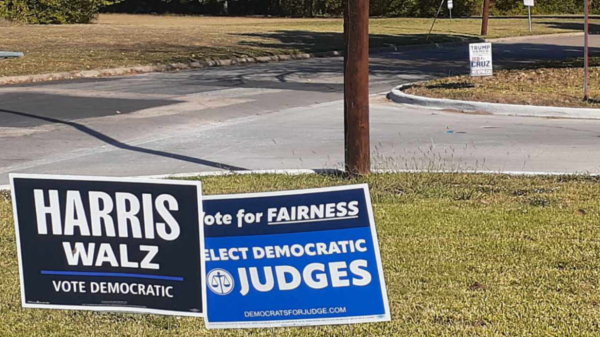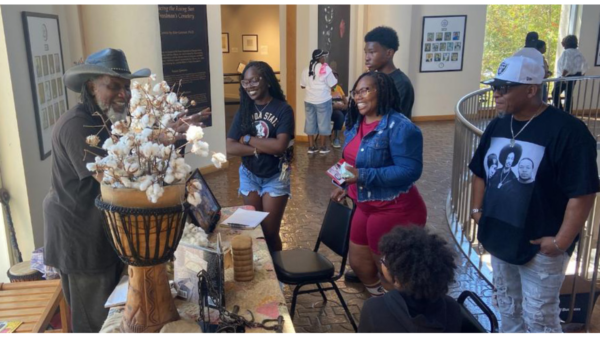Visit exhibit. See what you think.
By Norma Adams-Wade

Who would have thought that African Americans were a prime factor in the economic development, population growth, and wealth expansion of the city of Dallas and state of Texas?
That is the well-researched, thought-provoking premise of an exhibit about African Americans and Dallas cotton history at the African American Museum at Fair Park, 3536 Grand Ave at Robert B. Cullum Blvd in South Dallas/Fair Park. The exhibition is open now through Juneteenth/June 19, 2025.
Opening activities and a reception that featured Black culture dishes were held April 19-20, 2025, a lecture and cotton products were featured on April 27. Various activities will continue through the Juneteenth closing festivities.

“Mama Opal” Lee, known as the Mother of Juneteenth, visited the opening activities. She congratulated exhibit curator Clarence E. Glover Jr., aka “Professor Freedom,” toured the exhibit, and talked with Glover about cotton and its emotional ties to African heritage.
“Her visit was historically and generationally significant,” Glover commented. “At age 98, almost a centenarian, she represents the bridge between our elders who lived through Jim Crow and heard the stories of slavery and the hardships of labor from their elders. Now, she has become an ambassador for freedom, culture, cotton, and commerce.”

American Museum. Credit Clarence Glover Jr.
Dr. Marvin Dulaney, museum deputy director and Chief Operating Officer, attended opening activities. Museum interim director Margie Johnson Reese – a long-time, prominent arts management executive, reviewed and applauded the exhibit earlier.
Reese took the helm when museum founder and director Dr. Harry Robinson Jr. retired after 50 years at the close of 2024.
Kimberly Bizor Tolbert – Dallas’ new city manager and the first African American female to hold that position – visited the exhibit and complimented Glover and wished him success with the exhibit.
Mythe Kirven, a community advocate and prominent member of Delta Sigma Theta Sorority Inc. in Dallas, said that, even as a long-time Dallas resident, the exhibit “was educational. I learned a lot about how… (African Americans contributed to) cotton being king in Dallas, Texas. …It put some things together for me.”

The exhibit title makes a clear statement that descendants of Africa were the source of Dallas’ cotton wealth: “Big D Cotton: Without Us. A DEI Exhibition.” The exhibit drives home the point that African descendants, bound in slavery, produced the muscle and labor that made Dallas rich.
Yet, the enslaved and later newly freed African descendants received no share of the wealth that their labor produced.
“Cotton built this city,” curator Glover Jr. said, stressing that Dallas “could not have done so without us — descendants of Africa.” One strong piece of evidence that Glover Jr. cites is the startling 1830s quote about Texas and slavery from entrepreneur and land developer Stephen F. Austin, known as The Father of Texas: “nothing would be more central to establishing a cotton empire in Texas than the institution of slavery,” the Texas State Historical Association quotes Austin saying. “The principal product that would elevate us from poverty is cotton, and we cannot do this without the help of slaves.”
Glover Jr. has long proclaimed the “without us” theme in his lectures, writings, and previous exhibits. The historian, educator, faith minister, and civil rights protégé of the Martin Luther King Jr. family is a descendant of an African American family that for generations owned and cultivated cotton land in his hometown community just outside of Shreveport, Louisiana.
He stresses that while Ft. Worth is known as Cattle Town, technically Dallas should be known as Cotton Town. By 1900, Dallas had become the nation’s largest inland port for cotton.
But by the late 19th Century, Dallas became known more as a leading business and trade center.
Still, many remnants of Dallas’ cotton heydays still exist, and Glover Jr. has spent countless hours researching and documenting his Dallas cotton findings. He displays many of them in the exhibit – showing how descendants of Africa were left out of the financial bounty or received piddling pay for their labor.
Historical records fully detail the cotton history of the various remnants. These structural relics include the Dallas Love Field community; in downtown Dallas both the renovated Continental Gin Building and for long-time residents, memories of the 17-story Dallas International Cotton Exchange Building, imploded in 1994, and now occupied by part of First Baptist Church.
In South Dallas/Fair Park there are both the Mill City cotton mill factory neighborhood founded in 1903 with the noble goal to train African Americans in cotton manufacturing and the once Black-owned Bilal Building across from J. J. Rhoads Learning Center on 2nd Avenue near Elsie Faye Heggins St.
Glover Jr. is a graduate of Grambling State University and Perkins School of Theology. He has directed multicultural education at Southern Methodist University and Dallas Independent School District.
As a civil rights activist, he was coordinator and interviewer for the now classic PBS documentary In Remembrance of Martin. In 2020, he founded the National Association of African American Cotton Pickers (N Triple A CP) and the annual National African American Cotton Pickers’ Day, always the 4th Monday in October – this year Oct. 27, 2025.
He recently founded King Cotton Kreations through which he crafts art pieces with cotton bolls. He also is writing a proposed book whose title conveys the message: Without Us: African American Cotton Pickers and Dallas, Texas.
Versatile is an apt description of “king cotton” that Glover Jr. also calls “white gold” in his lectures. He quotes sources who recite cotton’s various uses. Federal Reserve notes – paper money — are a blend of 25 percent linen and 75 percent cotton, Glover Jr. says.
Farmers federations say if you hold one $100 bill in your hand, please know that a standard 500-lb bale of cotton will produce 313,600 of those bills, or — if you choose other products, you get massive numbers of bed sheets, towels, jeans, or T-shirts.
I was just thinking…despite the merits of this visually appealing plant, whose history traces back 6,000 years, cotton remains a polarizing factor. Jews say never forgot their painful history so it will not be repeated.
We descendants of African seek to erase our painful past, thus blocking any lessons that might be learned. How do we overcome? Do we heal ourselves? Need a national apology? Are reparations the answer?
Visit the exhibit and you decide.
Norma Adams-Wade, is a proud Dallas native, University of Texas at Austin journalism graduate and retired Dallas Morning News senior staff writer. She is a founder of the National Association of Black Journalists. norma_adams_wade@ yahoo.com.









You must be logged in to post a comment Login